Ministers today dismissed strike threats over a 3 cent pay rise for the NHS – pointing out taxpayers have spent £350billion fighting the pandemic and other public sector workers are facing a freeze.
Unions have been raging about the increase for nurses and other staff, which will be backdated to April, demanding up to 15 per cent after coronavirus heaped pressure on services.
The British Medical Association and the Royal College of Nursing are among the groups that have said they are looking at industrial action over the long-awaited settlement, which was trebled from an original offer of 1 per cent on the recommendation of a review body.
But in a round of interviews this morning Business Secretary Kwasi Kwarteng stressed that the NHS was being made a special case with the public finances in tatters. Police and teachers earning more than £24,000 will see no increase this year.
The announcements came after the private sector started to show signs of wage recovery, following 16 months in which workers have seen their incomes battered by furlough, pay freezes and redundancy.
Mr Kwarteng told Sky News: ‘The independent review has recommended a 3 per cent increase and the Government has decided that we’ll go with the independent review.
‘I think that’s entirely fair. Obviously we’d like it to be more but you’ve got to remember we spent £350billion to deal with the pandemic.
‘I think 3 per cent, which, after all, was what the independent review came up with, is a fair number.’
Those who will benefit from the health service pay boost include nurses, paramedics, consultants, dentists and salaried GPs, as well as domestic staff and other support workers.
They are being recognised for their ‘extraordinary efforts’ during an ‘unprecedented year’, the Department of Health and Social Care said.
Officials said the pay bump will mean an additional £1,000 a year for the average nurse, while porters and cleaners will receive around £540. It is expected to cost the government £2.1billion a year, with Downing Street saying the money will come from within existing budgets
However, unions have demanded a rise of at least five per cent, with surgeons and senior doctors threatening to strike for the first time in decades if demands are not met. The RCN has urged a 12.5 per cent hike.
Campaigners — including former Labour leader Jeremy Corbyn — yesterday handed in an 800,000-strong petition to Downing Street demanding a 15 per cent boost.
Speaker Lindsay Hoyle today read the riot act to ministers over the shambolic manner in which the news emerged yesterday, with care minister Helen Whately making a statement to the House but failing to deliver the information that had been expected. It was then sent out in a press released by the Department of Health hours later.
Mr Hoyle issued a brutal rebuke before vaccines minister Nadhim Zahawi addressed the House today, dismissing excuses that Sajid Javid was isolating after testing positive for Covid. ‘We have all got constituents who work for the NHS,’ Mr Hoyle said.
Mr Zahawi offered his apologies for the bungling.
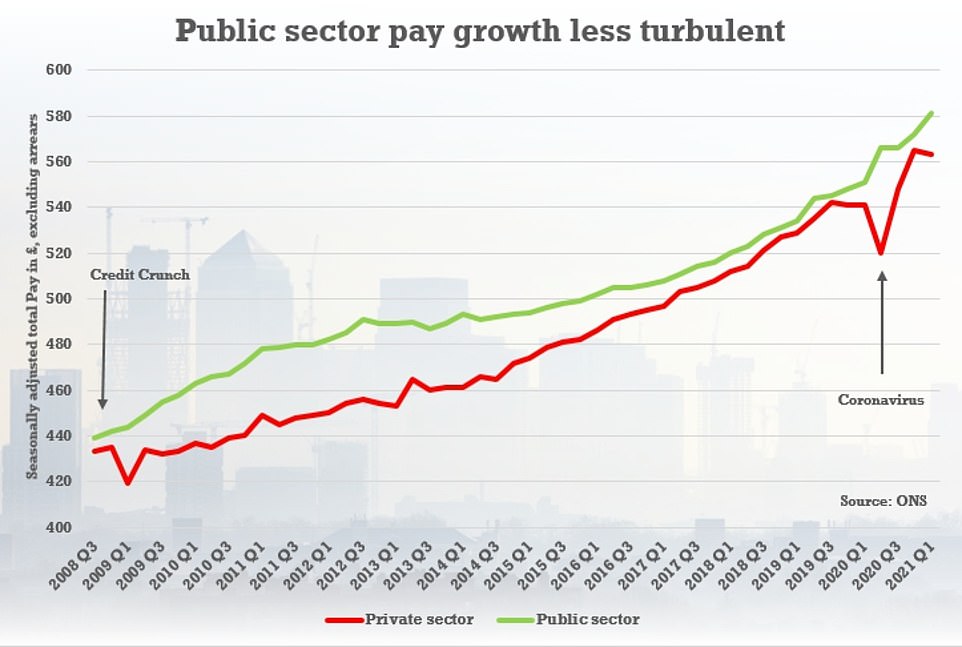
In cash terms, public sector pay has risen more steadily than private sector pay, which has seen significant dips during the pandemic and the Credit Crunch. The different types of jobs in each sector means that the overall pay level is not directly comparable in this chart
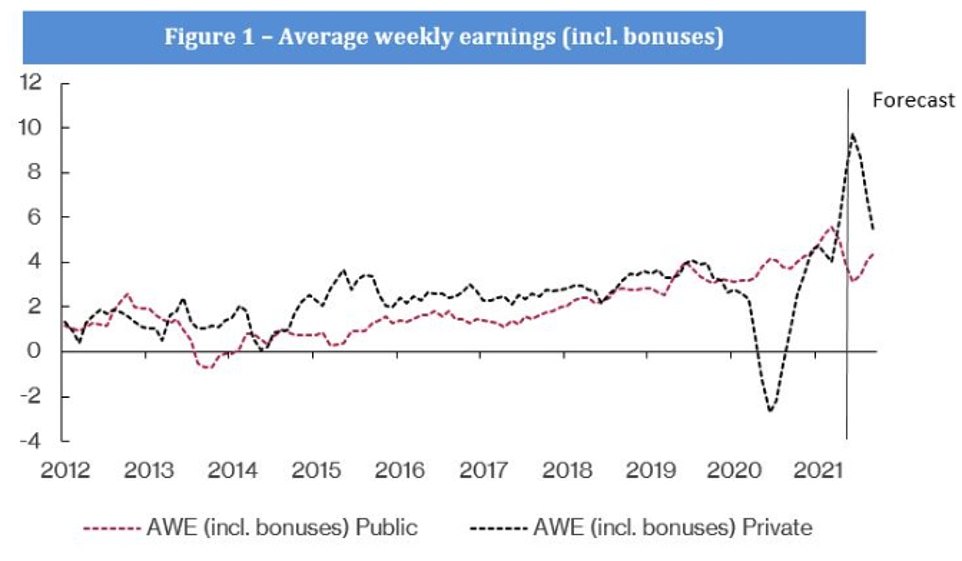
This NIESR chart shows percentage growth in wages in each sector over time. Private sector workers were hit harder by pandemic and many will have gone without a pay rise last year, but wage growth is recovering this year as the economy bounces back
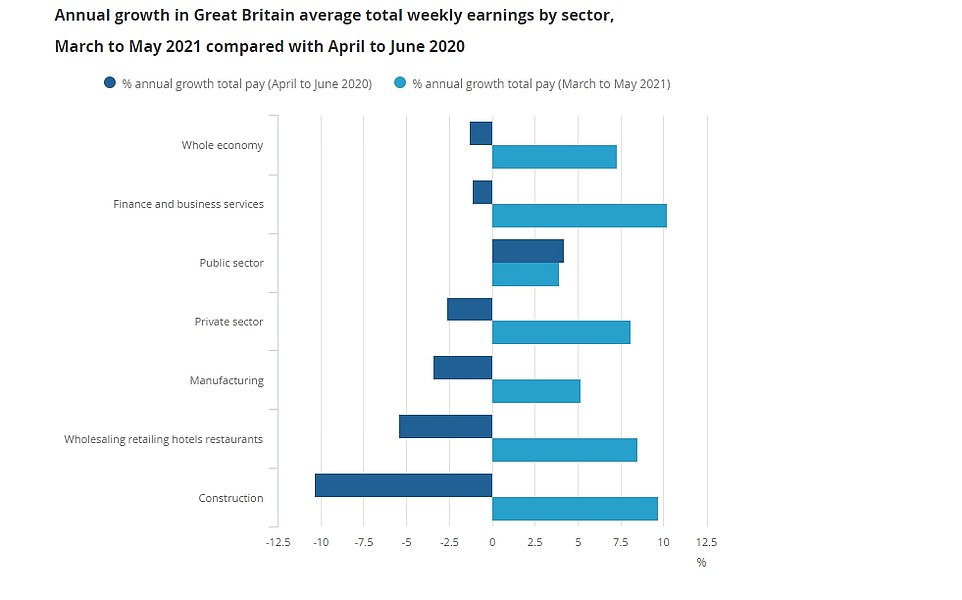
This ONS chart shows that the private sector saw sharp falls in annual wage growth in the first quarter of last year, as the first lockdown wreaked havoc. In contrast the public sector continued to see steady wage growth
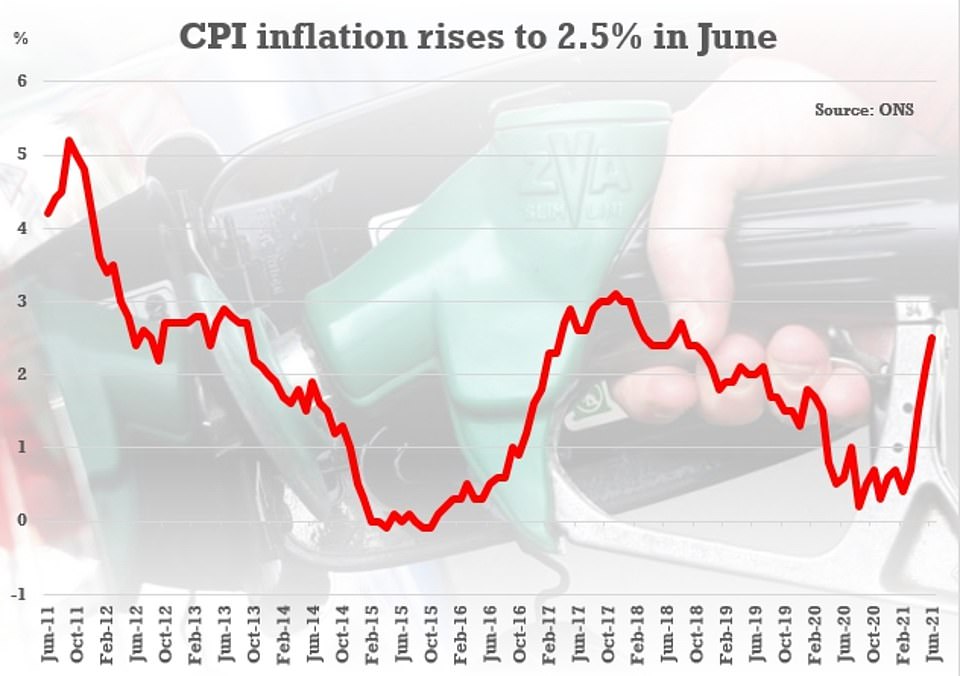
A 3 per cent rise for NHS staff would be above the latest rate of CPI inflation – although it has been rising fast
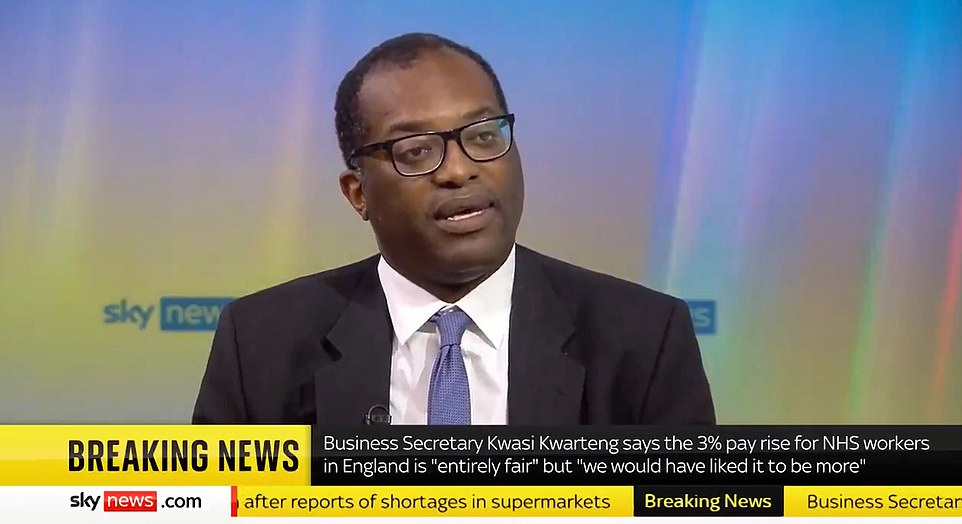
In a round of interviews this morning Business Secretary Kwasi Kwarteng stressed that the NHS was being made a special case with the public finances in tatters. Police and teachers earning more than £24,000 will see no increase this year
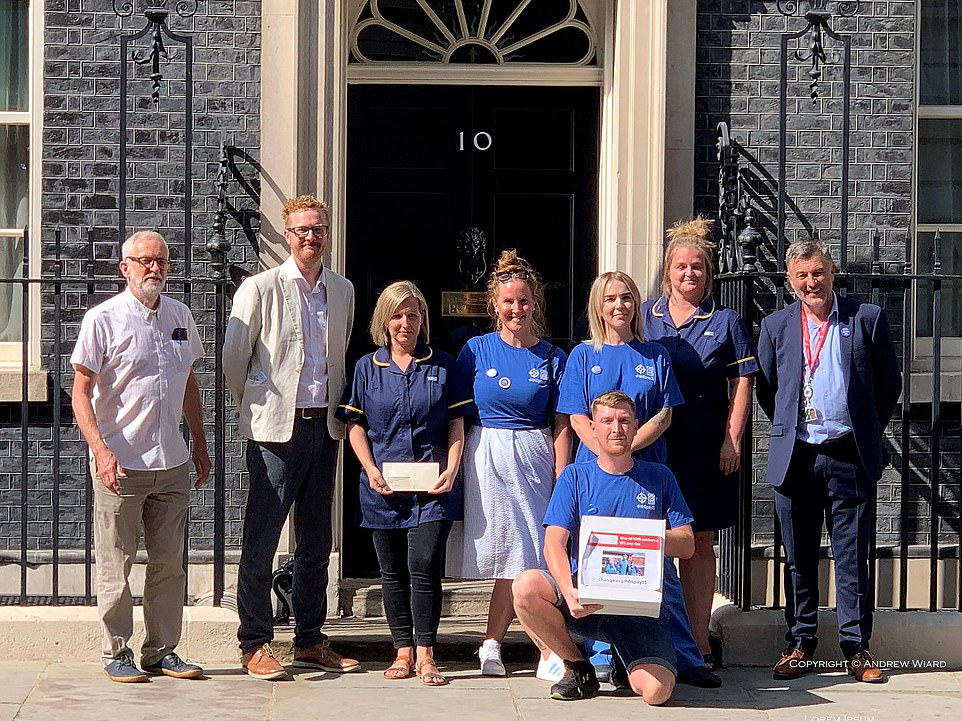
Former Labour leader Jeremy Corbyn (left) joined protesters from the GMB trade union outside Downing Street yesterday where they delivered a petition signed by 800,000 people for better pay for NHS staff
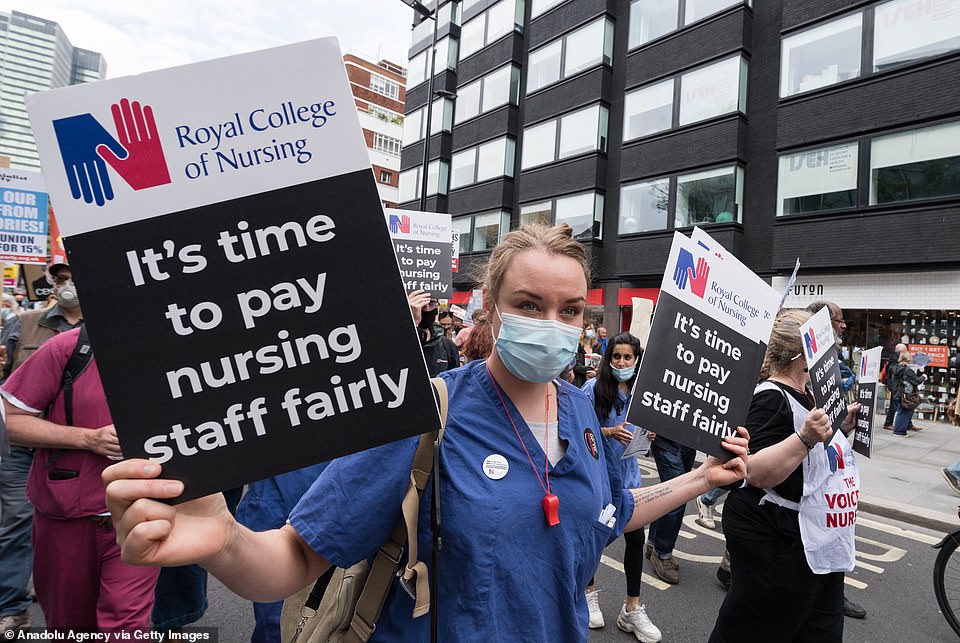
Unions have warned that the 3 per cent pay rise for NHS staff is not enough. Pictured, protests in London earlier this month
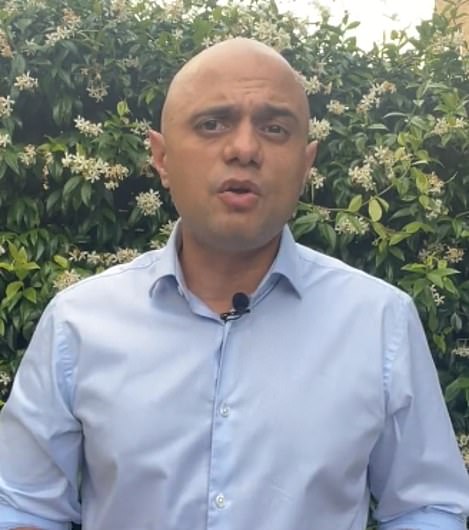
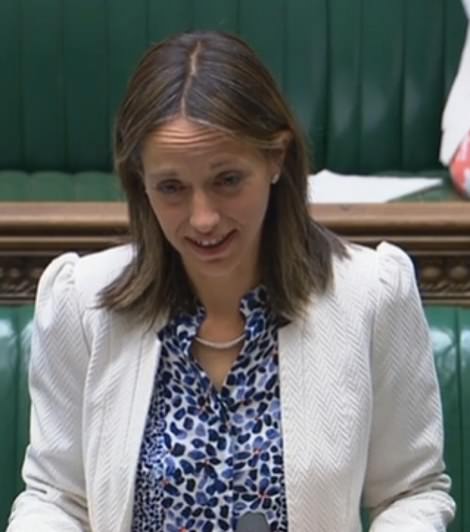
Health and Social Care Secretary Sajid Javid said the announcement showed the government’s willingness to ‘back the NHS’. Health minister Helen Whately was widely anticipated to reveal the move in a statement to the Commons this afternoon but the deal was oddly left out of her speech
UK debt pile hits £2.2TRILLION – highest relative to GDP since 1961
The UK debt pile hit £2.2trillion last month – the highest relative to GDP since 1961 – but borrowing started to ease as the economy recovered. The government racked up another £22.8billion of liabilities, the second highest on record for June – but down from £28.2billion a year earlier.
Although the figure was slightly above the expectations of analysts, it was below the estimates from the OBR watchdog in the spring, giving Rishi Sunak some much-needed breathing room. In a worrying sign, the official data showed that the government spent £8.7billion on interest payments for its debts – up from just £2.7billion in June 2020 as rates have increased.
The Chancellor pointed to the huge package of support he had implemented to shore up jobs and businesses, but stressed he was taking ‘tough choices’ to get debt back under control. According to the Office for National Statistics, borrowing so far this financial year has reached £69.5billion since the end of March – £49.8billion less than the same period a year ago.
Advertisement
The Home Office confirmed last night that police officers will not be compensated for their work during the pandemic and will have their salaries capped until at least 2022.
Home Secretary Priti Patel said: ‘This is in order to ensure fairness between public and private sector wage growth, as the private sector was significantly impacted by the Covid pandemic in the form of reduced hours, suppressed earnings growth and increased redundancies, whilst the public sector was largely shielded from these effects.’
And Education Secretary Gavin Williamson said there will be a pause to headline pay rises for teachers this year, which school leaders branded an insulting ‘slap in the face’.
In total, pay will be frozen for around 1.3million public sector workers earning more than £24,000 per year, but those in the lowest paid jobs will be given an annual rise of £250. The Police Federation of England and Wales called the move ‘a disgrace’.
Private sector workers were hit far harder by the pandemic and many will have gone without a pay rise last year, while the public sector saw salaries keep growing.
However, data shows wage growth is recovering this year from a low base as the economy bounces back.
Dr Tom Dolphin, a spokesman for the British Medical Association (BMA) and a consultant anaesthetist in central London, told Sky News that medics would consider the option of industrial action.
He said that ‘over the last 10 years, our pay has fallen in value by about a third’, adding that exhausted doctors were leaving the NHS.
Asked if workers would potentially consider industrial action, he said: ‘We’re not at that stage yet. What we’re going to be doing is we’re going to be sending out a survey to our members today and over the next week or so, to check and make sure that they are as angry and disappointed about this pay offer as we are at the BMA and if so what they’re prepared to do about it.
‘And industrial action will be on that list of things they might want to consider, and we’ll see what people are prepared to do to defend their pay.’
Pat Cullen, interim general secretary of the RCN, told BBC Breakfast that the option of industrial action will be put to nurses next week in a consultative ballot ‘and they will decide’.
‘But, as their professional trade union, we will walk alongside them and their decision-making because nurses will do the best thing for patients,’ she said.
‘Whatever action they take, they will make sure their patients don’t suffer as a consequence, same way as they did in Northern Ireland two years ago when they took industrial action.
‘They did that for their patients and for patient safety and patient care, and they will do the same if they need to in any of the other countries, but they won’t do it at a whim, they will make measured and considered decisions, and we will work with them to make those decisions.’
Matt Kilcoyne, deputy director of the Adam Smith Institute, told MailOnline: ‘No responsible nurse or any NHS worker, knowing their duty to the care of their patients is paramount in their vocation, would surely go on strike over something they consider so grubby as a pay dispute over an inflation busting increase of 3 per cent?
‘Surely not during what could see thousands hospitalised and in desperate need of their care? Surely not when they have the most financially secure jobs in the country, paid for by those whose jobs remain in the balance of us seeing out this disease and rebuilding our society. Lives are on the line and nurses know that when they are, you do your part.’
The NHS pay announcement came just hours after health minister Helen Whately told the Commons there still wasn’t a deal between the government and the review body.
The omission prompted a backlash from Labour and trade unions, who branded it an ‘utter shambles’.
Speaker Sir Lindsay told MPs today: ‘I was far from happy that yesterday the House heard from a health minister giving us an NHS update with no mention at all of the pay deal for NHS, a point of great political interest.
‘I find it hard to believe that any negotiations were still going beyond that time. I’d urge the Government again to ensure the House is the first, not the last, to know.
‘It’s not my fault the Secretary of State (Sajid Javid) got pinged. But if he does want to make announcements from his garden, somebody could have been here, the minister could have shared that information with us.’
Sir Lindsay went on: ‘The clear message is, once again, this House should be told.’
Mr Zahawi said: ‘Can I offer the apology of the Secretary of State and the Department of Health on the inability of the department to make a statement on the acceptance of the independent pay review body that NHS staff should get 3 per cent.’
Sir Lindsay welcomed the apology, but swiped: ‘It makes it worse when the minister is actually at the despatch box when all this is going on outside, and to turn to the House and say ‘well I can’t tell you’, not ‘I don’t know’ but ‘I can’t tell you’, is even more worrying.’
The Times reported the boost for NHS workers will be paid for out of the National Insurance increase, which was thought to be earmarked for social care. However, the speculation is that would come into effect from next April, while the pay rise is being backdated to last April.
A Downing Street spokesman said: ‘The pay uplift will be funded from within the NHS budget but we are very clear that it will not impact funding already earmarked for the NHS front line.
‘You will already know that we gave the NHS a historical settlement in 2018, which saw its budget rise by £33.9billion by 2023/24 and we’ve provided £92billion to support the NHS and social care throughout the pandemic.’
At the start of July the BMA advised ‘exhausted and demoralised’ members to take industrial action if the annual pay bump is not increased to at least five per cent.
Scotland has already announced a 4 per cent bump to most NHS staff pay, which will be backdated to December.
Health and Social Care Secretary Sajid Javid said the announcement showed the government’s willingness to ‘back the NHS’.
He added: ‘NHS staff are rightly receiving a pay rise this year despite the wider public sector pay pause, in recognition of their extraordinary efforts.
‘We will back the NHS as we focus our efforts on getting through this pandemic and tackling the backlog of other health problems that has built up.
‘I will continue to do everything I can to support all those in our health service who are working so tirelessly to care for patients.’
But the GMB trade union described the rise as an ‘appalling’ offer and warned staff morale had hit ‘rock bottom’.
Rachel Harrison, GMB’s national officer, said: ‘NHS staff are on their knees – exhausted, fatigued and anxious – as we look set to enter another wave of the covid pandemic. Staff morale is rock bottom.
‘Hospitals and ambulance services are operating under extreme pressures due to rising demand and staffing shortages.
‘Now, rather than focussing on staff welfare they are being advised to enter the workplace against self-isolation advice and now given this frankly appalling pay offer.
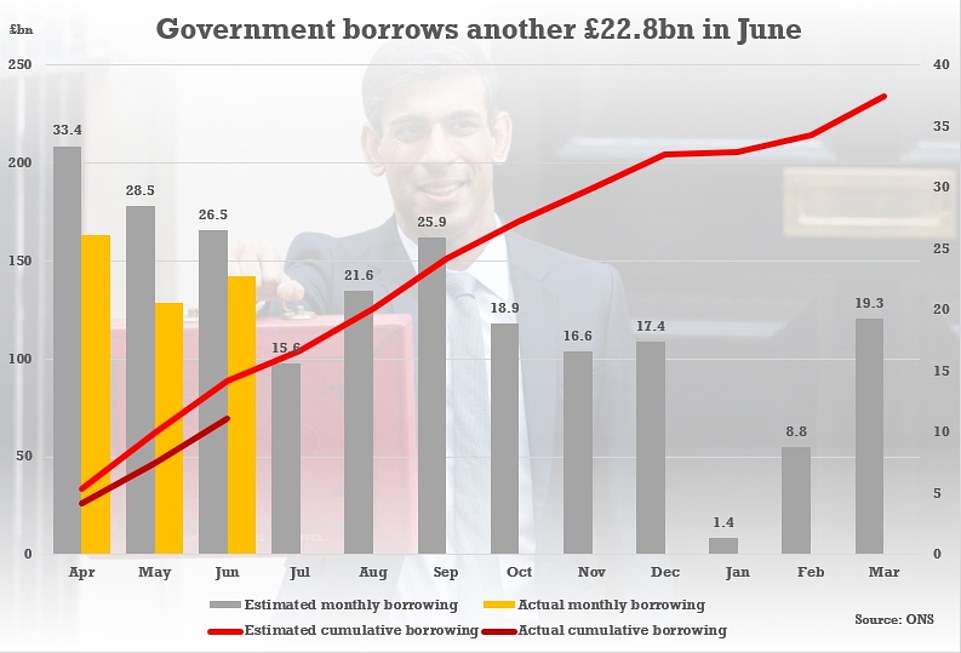
Although the figure was slightly above the expectations of analysts, it was below the estimates from the OBR watchdog in the spring
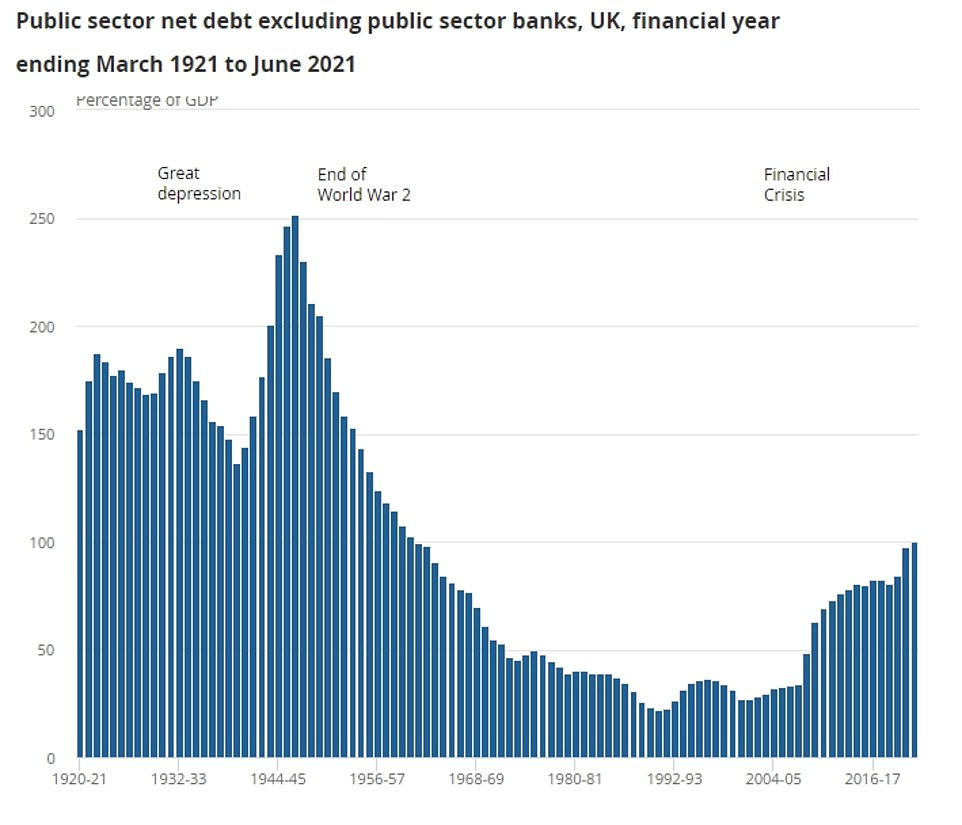
The amount of debt sat at an eye-watering £2.2trillion at the end of June, or around 99.7 per cent of GDP, the highest ratio since the 102.5 per cent recorded in March 1961
‘This was the opportunity for Government to turn their clapping in to genuine recognition. Their response is paltry. They have failed spectacularly.
‘NHS workers know their worth and so do the public – shame on the government who don’t.’
The government has improved on its initial offer of 1 per cent back in March, which caused a furore.
Critics said that would have effectively been a pay cut because inflation levels are expected to rise above 2.4 per cent this year due to the pandemic.
Unison general secretary Christina McAnea said the pay award was ‘an improvement’ on the Government’s ‘earlier, miserly 1 per cent proposal’.
She added: ‘But the increase falls short of what NHS staff deserve after the past 16 months.
‘It’s less than the wage rise given to Scottish health colleagues and not enough to protect the NHS.
‘Porters, cleaners, nurses, paramedics and other health workers have waited for months for what they hoped would be a fair deal.
‘Ministers could have paid up last year if they really valued the NHS. Instead, staff have been made to hang on until the summer – long after their wage rise was due.’
The RCN’s interim general secretary and chief executive, Pat Cullen, said the ‘shambolic’ offer had come after a ‘shambolic’ day.
Ms Whately, the health and social care minister, was widely expected to announce the rise in the Commons yesterday.
When she was repeatedly challenged by MPs on what had happened to the announcement, Ms Whately said: ‘We will be announcing our decision on NHS pay in due course.’
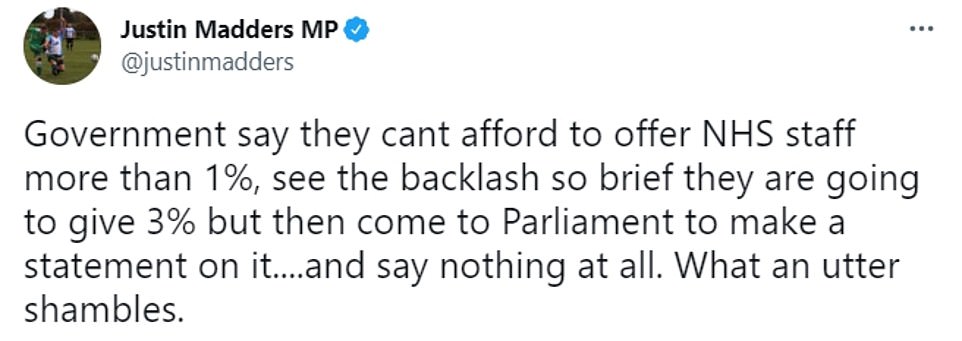
The government was accused of an ‘utter shambles’ today as an expected announcement on NHS pay failed to arrive

Shadow health secretary Jon Ashworth was among those bewildered by the lack of an announcement
NHS surgeons threaten to strike over pay row
Surgeons and other senior doctors in England are threatening to strike if No10 does not improve the one per cent pay rise it proposed for NHS staff.
The British Medical Association said that the original offer was ‘little more than an insult’ after a year of battling the pandemic.
It will will advise ‘exhausted and demoralised’ members to take industrial action if the annual pay bump is not increased to at least five per cent. The BMA had originally been calling for a 12.5 per cent rise.
Striking would involve stopping all overtime, paid and unpaid. Doctors generally work up to 20 per cent over their contracted hours every week, the BMA said.
The move could be highly disruptive as the NHS tries to clear record backlogs triggered by the pandemic.
A record 5.12million people are on waiting lists in England for routine care, the highest since records began. Among them, 65,000 have been waiting for more than 18 months.
And there are early signs that hospital rates from Covid are picking up too, with 304 patients admitted with the virus on June 28, the latest data available.
This was a 35 per cent rise on the previous week but still a far cry from levels in previous waves of the Covid crisis.
Consultants, the most senior doctors in hospitals, have not taken any industrial action since the 1970s, apart from one day of action over pensions in 2012.
Advertisement
Mr Cullen said: ‘After a shambolic day, comes a shambolic announcement. When the Treasury expects inflation to be 3.7 per cent, ministers are knowingly cutting pay for an experienced nurse by over £200 in real-terms.
‘Hospitals and other parts of the NHS are struggling to recruit nurses and healthcare support workers.
‘The government has been warned that many more are on the verge of leaving. With today’s decision, ministers have made it even harder to provide safe care to patients.
‘This announcement is light on detail. It must be fully-funded with additional monies for the NHS and ringfenced for the workforce bill.
‘Nursing staff will remain dignified in responding to what will be a bitter blow to many. But the profession will not take this lying down. We will be consulting our members on what action they would like to take next.’
Labour had earlier voiced outrage at the absence of an offer for staff.
Shadow health minister Justin Madders tweeted: ‘Government say they cant afford to offer NHS staff more than 1 per cent, see the backlash so brief they are going to give 3 per cent but then come to Parliament to make a statement on it… and say nothing at all.
‘What an utter shambles.’
And shadow health secretary Jon Ashworth said: ‘After these past 16 months our brave, hardworking NHS staff deserve so much better than this insulting shambles.
‘Rather than a real terms pay cut Sajid Javid needs to get a grip and deliver the decent, fair pay rise NHS staff deserve.’
Labour MP Rosena Allin-Khan, shadow health minister and an A&E doctor in London, said the failure to deliver the pay rise before the summer recess was ‘an insult of the highest order’.
‘Low-level awards of a couple of percent would look timid and insult staff when the challenges they face have never been greater.’
Unite national officer for health Colenzo Jarrett-Thorpe said: ‘If the Pay Review Body is recommending a 3 per cent pay rise, it is a small step forward on the insulting 1 per cent the Government offered in March.
‘However, this recommendation in no way recognises the 19 per cent drop in real earnings that many NHS workers have endured in the last decade, nor the immense sacrifices that health staff have and are continuing to make as Covid infection rates rapidly rise again.
‘It doesn’t match the 4 per cent the Scottish Government offered to NHS workers backdated to December 2020.
‘Three per cent will also do very little to staunch the escalating recruitment and retention crisis and free up resources to tackle the enormous backlog in non-Covid procedures, such as hip replacements.’
Figures released by the Office for National Statistics earlier this month showed that growth in average total pay (including bonuses) was 7.3 per cent and regular pay (excluding bonuses) was 6.6 per cent.
However it acknowledged that the figure was being inflated by job protection measures including the furlough over the past 16 months.
Because many workers were being paid not to work or had their hours drastically reduced, last year’s figures slumped massively.
But it means that as the economy opened up this year there was a counteracting increase as workplaces opened up again.
Viewed through this prism a three per cent pay increase may be seen as more generous as it might initially appear.
Striking would involve stopping all overtime, paid and unpaid. Doctors generally work up to 20 per cent over their contracted hours every week, the BMA said at the start of July.
However the move could be highly disruptive as the NHS tries to clear record backlogs triggered by the pandemic and the threat came before the current spike in Covid cases.
A record 5.12million people are on waiting lists in England for routine care, the highest since records began. Among them, 65,000 have been waiting for more than 18 months.
In March, then health secretary Matt Hancock infuriated NHS staff by claiming the 1 per cent pay offer for frontline staff was ‘fair’ and insisted no-one cares about nurses more than him.
He told the Downing Street press conference the offer, which medics have described as a ‘slap in the face’, was based on ‘affordability’ and that the pandemic had brought ‘financial consequences’.
Mr Hancock – who promised last year he would ‘fight’ to ensure the NHS was given a ‘reward’ in the aftermath of the pandemic – claimed he ‘bowed to no-one in his admiration’ for nurses, adding: ‘I learnt that at the knee of my grandmother who was a nurse.’
Meanwhile school leaders described the confirmation of a pay freeze for teachers as completely unacceptable and an insulting ‘slap in the face’.
In a written ministerial statement on Wednesday, Education Secretary Gavin Williamson said there will be a pause to headline pay rises for the majority of public sector workforces in 2021-22.
He said the School Teachers’ Review Body (STRB) has recommended a pay award of £250 for all teachers earning less than £24,000.
Mr Williamson said: ‘I would like to reiterate that the £250 award should be paid to all eligible teachers, whether located on a published pay point or not, and that the pause on pay will apply to headline pay uplifts only.’
In a report published on Wednesday, the STRB said it was asked last December for its recommendations on increases for those earning less than £24,000 per annum (or part-time equivalent).
The STRB report said: ‘We recognise the exceptional pressures placed on the economy and on public sector finances by the Covid-19 pandemic.
‘However, we are firmly of the view that a pay pause for teachers of more than one year risks a severe negative impact on the competitive position of the teaching profession, jeopardising efforts to attract and retain the high-quality graduates necessary to deliver improved pupil outcomes.
‘The Review Body urges that we be allowed to fully exercise our role in making recommendations on pay uplifts for all teachers and school leaders for 2022/23, based on the evidence, including conditions in the wider economy.’
Paul Whiteman, general secretary of NAHT, the largest union for school leaders, said: ‘School leaders and teachers will be rightly angry that the Government’s pay freeze will deliver yet another a 3-4% real terms pay cut next year, based on the Treasury’s own predictions of inflation.
‘The teaching profession has long struggled to recruit and retain school leaders – NAHT’s survey evidence shows that the leadership pipeline is broken at all career stages.
‘Too few experienced teachers want to step up to senior leadership positions and even fewer can be persuaded to take on the heavy responsibilities of a head teacher. The pandemic is creating even greater recruitment and retention challenges.’
He said those considering leadership roles have seen the pressures created by the Government’s ‘chaotic’ response to the pandemic, and its ‘late, confusing and contradictory’ guidance.
Mr Whiteman added: ‘This pay cut risks further eroding leadership supply, and risks prompting an exodus of leaders when the pandemic finally lifts. A slap in the face doesn’t begin to describe it.’
Geoff Barton, general secretary of the Association of School and College Leaders, said: ‘Following a year in which teachers and leaders have worked flat out on managing a battery of Covid control measures as well as assessing students following the Government’s decision to cancel public exams, the decision to implement a pay freeze is an absolute insult.
‘It also risks worsening teacher shortages in our schools. Teacher and leader salaries have already failed to keep pace with inflation over the course of the past decade and the imposition of what is effectively another pay cut undermines retention of existing staff and makes salaries less competitive.’
Mr Barton said the Government must take a more strategic approach with a pay strategy that addresses the pay erosion of the past decade and with sufficient funding in place to make this affordable for schools.
‘It also beggars belief that the pay decision for the new academic year has come so late in the summer term when some schools have already broken up for the holidays.
‘Not only is this extremely discourteous to schools and teachers but it makes budget planning an exercise in guesswork if confirmation of the pay award is so delayed,’ he added.
Kevin Courtney, joint general secretary of the National Education Union, said: ‘The Government’s confirmation of its plans to implement a pay freeze for teachers and other public sector employees is completely unacceptable.
‘Teachers and other education staff are key workers – all of whom have contributed hugely to the country’s pandemic response. All education staff deserve a significant pay increase, not another real-terms pay cut.’
UK records 44,104 Covid cases in just a 4% week-on-week jump but deaths continue to rise with 73 more victims amid fears Freedom Day could be watered down in a FORTNIGHT unless hospital admissions start to slowSAGE has told PM he may need to roll back some curbs by end of first week of August if admissions don’t slowWould mark another extraordinary U-turn just three weeks after Freedom Day was given go-ahead on July 19Hospital admissions could be on par with first peak last spring by the end of this August, scientists now fear
Britain’s daily Covid infections have risen slightly today as another 44,104 people tested positive but deaths were up significantly with 73 more victims.
In a promising sign, today’s cases mark an increase of just 4 per cent on the figure last Wednesday. Fatalities, on the other, hand have risen by nearly 50 per cent week-on-week.
Some experts believe that increased mixing during the Euro 2020 final at Wembley earlier this month fuelled the epidemic and they expect cases to start declining by this weekend.
One of those scientists, Professor Paul Hunter, an epidemiologist at the University of East Anglia, told MailOnline: ‘Today’s infections are remarkably low. I think over next couple of days we’ll actually see some falls in cases.
‘I’m more convinced than ever that the government’s done the right thing by opening up this week. If we hadn’t had the Euros, infections might have already been falling already.’
However, hospitalisations are running higher than No10’s scientific advisers predicted at this point. Another 752 infected patients were admitted in England on July 19, the most recent day figures are available for. This was up 23 per cent on the week before.
Quickly rising hospital admissions have raised fears England could be forced back into a quasi-lockdown within weeks. SAGE has briefed Boris Johnson that he should be prepared to roll back some mandatory curbs — such as mask wearing, social distancing and home working — in the first week of August if hospitalisations don’t slow down.
It would mark another extraordinary U-turn and put an end to people’s newfound liberties just three short weeks after ‘Freedom Day’ was given the go-ahead on July 19.
In models published earlier this month, SAGE estimated that daily Covid admissions would reach between 1,000 and 2,000 at the peak of a third wave in late August, while daily deaths were tipped to hit between 100 to 200.
But there are already signs the crisis is on track to surpass those estimates. It suggests there could be 1,500 daily patients by the end of the first week of August and 3,000 by the end of the month, which would put the peak on par with the first wave last spring, when the NHS was close to breaking point.
NHS England has told hospitals they may be entering the ‘most difficult period’ of the Covid crisis for more than a year.
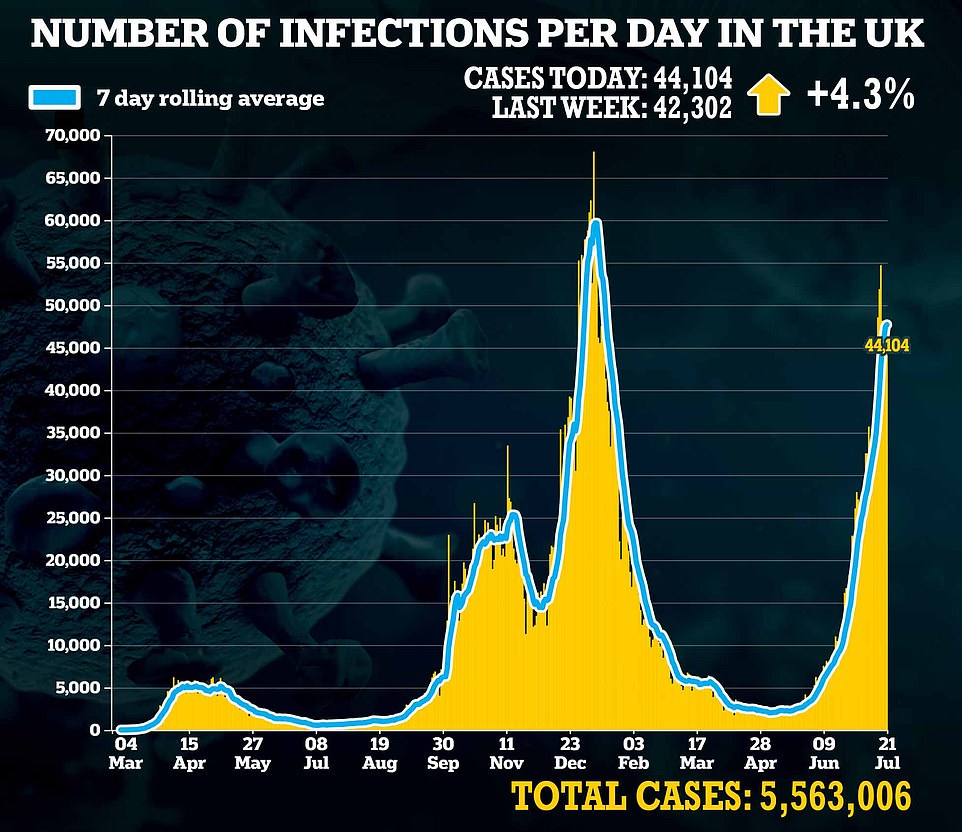
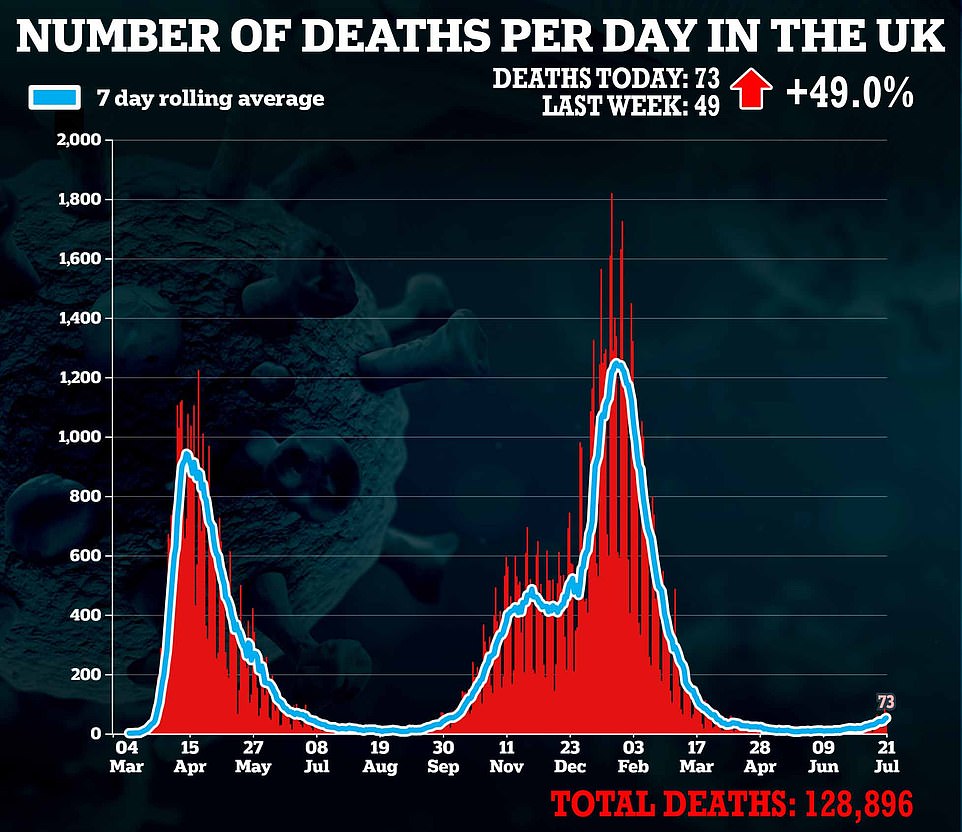
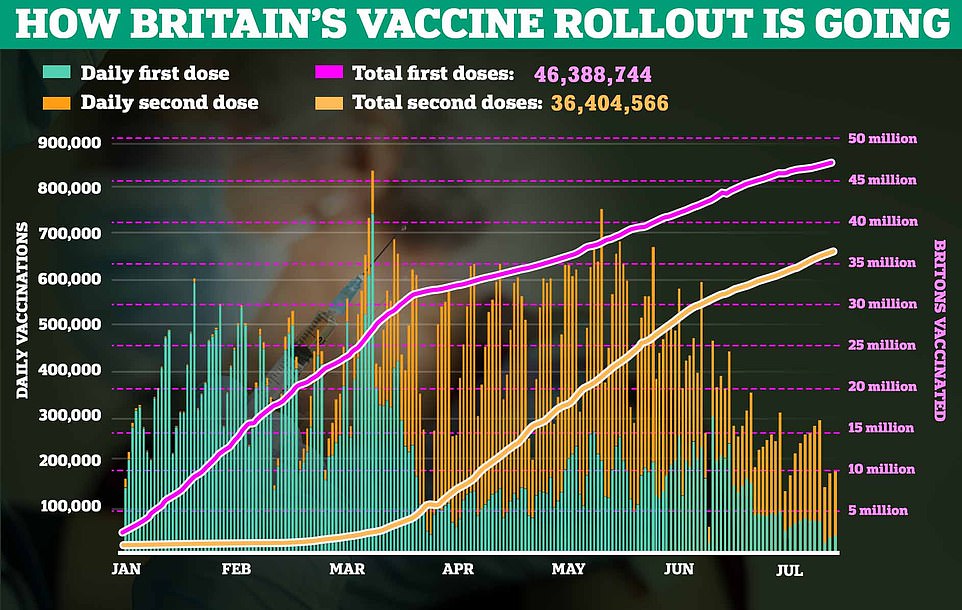
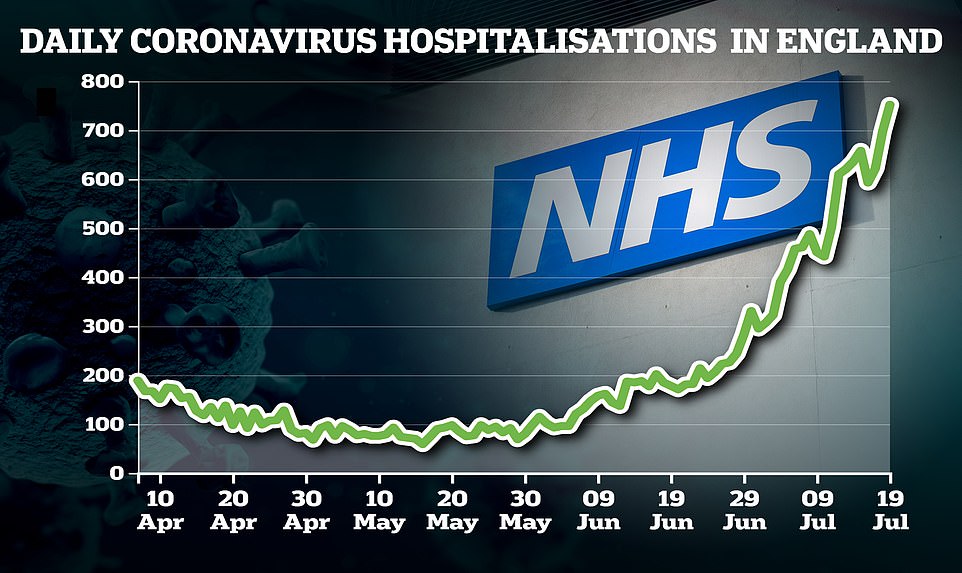
Another 752 infected patients were admitted in England on July 19, the most recent day figures are available for. This was up just 23 per cent on the week before
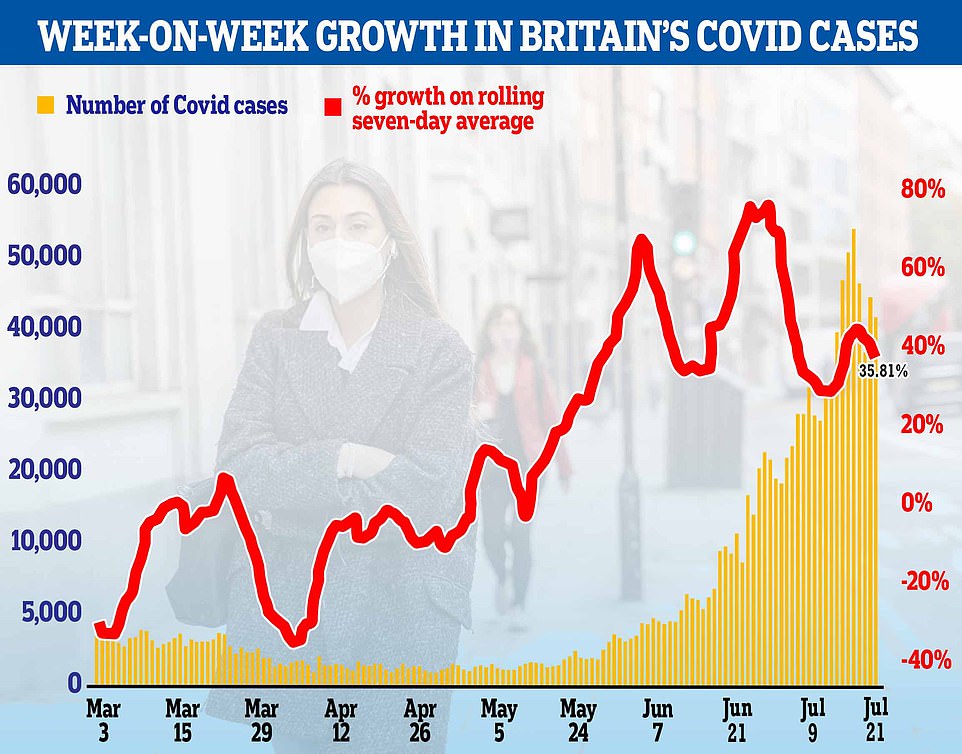
Although cases are still rising, the speed at which they are increasing has slowed in recent days. In June, the daily average number of infections was rising at up to 75 per cent per week compared to around 36 per cent now. The yellow bars show the number of positive tests each day and the red line represents the week-on-week percentage growth
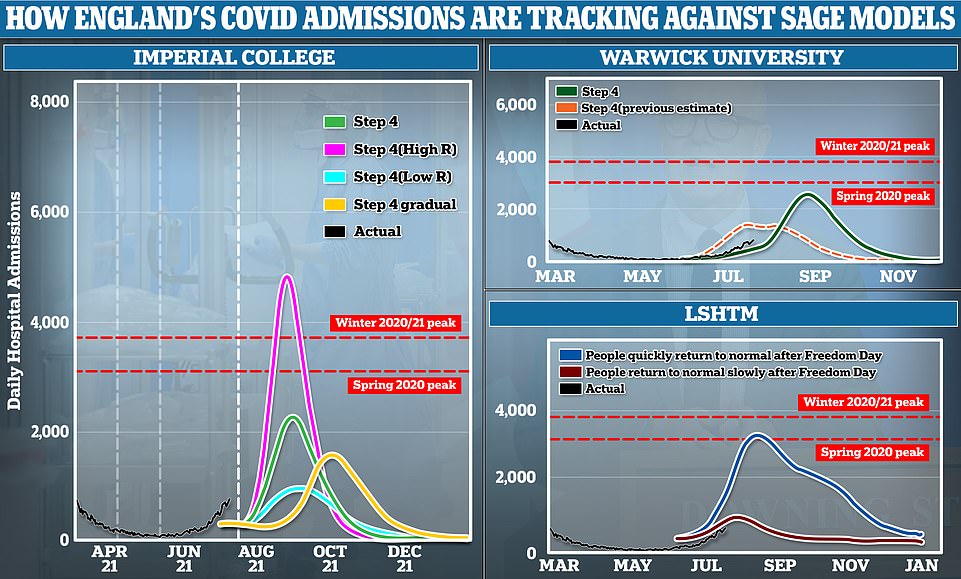
Three different teams within SAGE modelled how Covid hospital admissions could look after Freedom Day on July 19. Actual hospitalisations – which represent how many are occurring now – are shown in black and compared to various pessimistic, optimistic and central scenarios. The research teams simulated scenarios in which people quickly returned to normal and stopped wearing masks and others in which the public were more cautious. They also looked at various vaccine efficacy rates
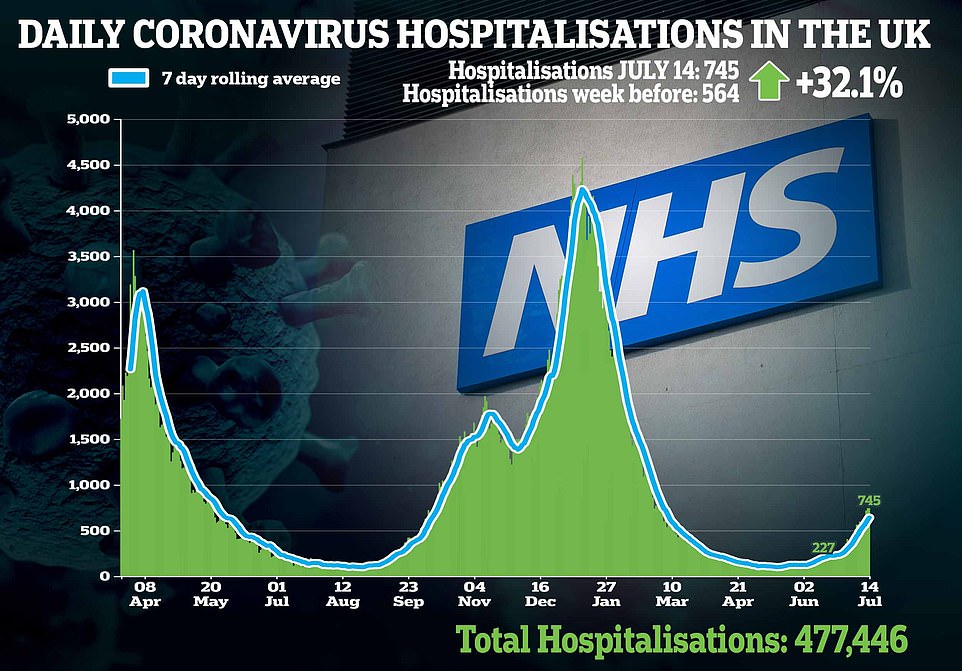
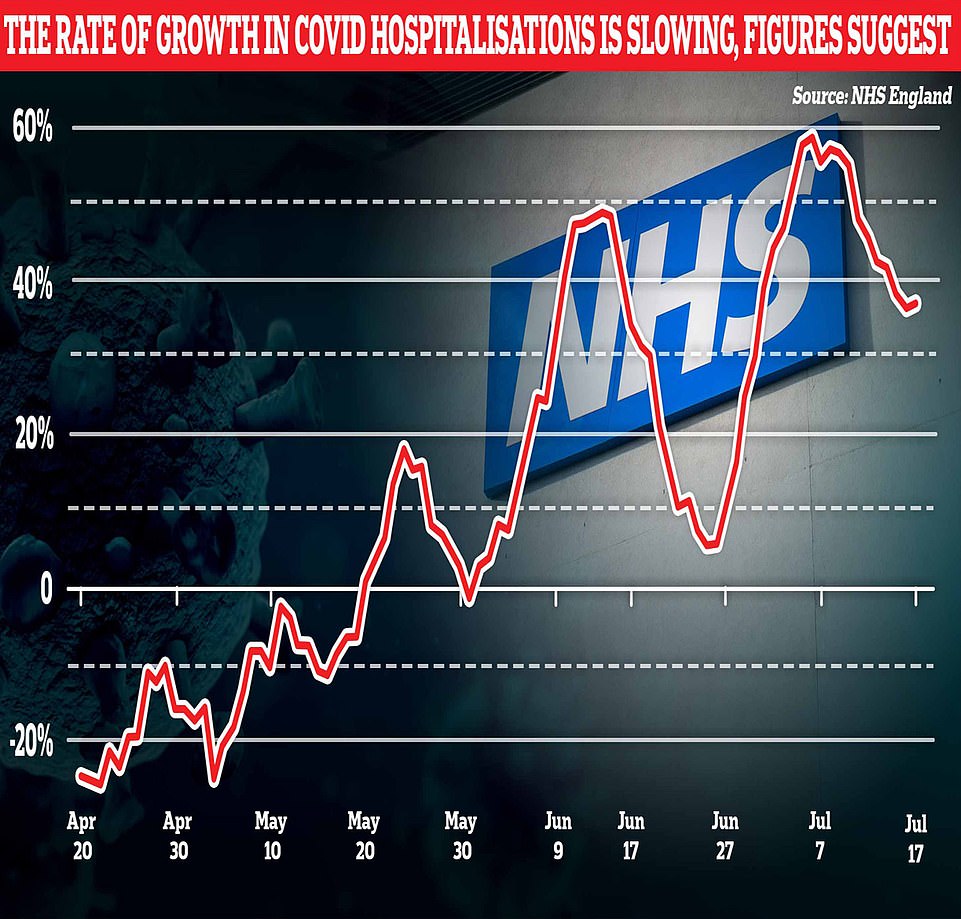
While hospitalisations are trending upwards across the UK, the rate at which the number is increasing is slowing. Week on week data in the three weeks leading up to July 13 showed the rate hospitalisations were increasing at dropped from 52.9 per cent, to 36 per cent and then 30.4 per cent
Revealed: More than 150 care homes across England have suffered at least TWENTY Covid deaths since pandemic began
More than 150 care homes across England have suffered at least 20 Covid deaths since the start of the pandemic, official data shows.
Figures released by the Care Quality Commission today — the first of their kind — showed nearly 7,000 facilities saw at least one coronavirus death.
Bedford Care Home in Leigh, Greater Manchester, had the worst virus death toll in the country, with 44 victims — 24 per cent of the home’s capacity.
But the second worst hit home in England — Calway House in Taunton, Somerset — had 41 fatalities, almost half its total number of beds (92).
Almost 40,000 care home residents have died from Covid, with the scandalous toll largely blamed on the move to discharge thousands of hospital patients into homes without testing them during the early days of the pandemic.
Advertisement Now Keir Starmer is forced to self-isolate: Labour leader goes into quarantine for the FOURTH time after one of his children tests positive for Covid
Labour leader Sir Keir Starmer has been forced to self-isolate today, minutes after appearing in the House of Commons to grill the quarantining Prime Minister.
One of the Opposition leader’s children tested positive at lunchtime, the party said, forcing him to self-isolate for the fourth time since the pandemic began.
Sir Keir was on the still socially distanced benches of the House of Commons at noon for Prime Minister’s Questions, where he was forced to face Mr Johnson via a videolink from Chequers.
The PM has been self-isolating since Sunday after Health Secretary Sajid Javid contracted coronavirus.
A spokeswoman for Mr Starmer said: ‘One of Keir’s children tested positive for Covid this lunchtime.
‘In line with the rules, Keir and his family will now be self-isolating.
‘Keir was already doing daily tests and tested negative this morning. He will continue to take daily tests.’
It means that the Prime Minister, Chancellor, Health Secretary and Opposition Leader are all currently in quarantine due to the current surge in Covid cases.
Advertisement
In a letter seen to NHS officials in the Midlands this morning, seen by the Health Service Journal, NHS England warned: ‘[The pressures are] compounded by the impact on staff absences and the need to maintain separate pathways.
‘At the same time, we are seeing unprecedented pressure on urgent and emergency care while trying to maintain the momentum created to tackle the long waiting elective patients…
‘We are entering, potentially, what will be the most difficult period since wave one of the pandemic…
‘The distribution of admissions and critical patients is uneven and closely linked to the lower levels of covid-19 vaccination.’
A Government source told The i that any national lockdown curbs reintroduced next month would be ‘less of an emergency brake and more of a gear change’, adding that mandatory face masks would be the ‘easiest’ measure to reimpose with the least resistance from the public.
A separate Government adviser told MailOnline that Mr Johnson should ‘stay strong’ and not be ‘blown off course’ at the first sign of adversity.
There will be questions about the timing of the leak, after it emerged today that ministers are preparing to adopt the new slogan ‘keep life moving’ in the coming days. It will replace ‘hands, face, space’ which was constantly repeated by ministers and featured heavily at Downing Street press conferences and on Government Covid warning adverts.
SAGE has insisted that there are still a lot of unknowns about how the epidemic will grow in the coming weeks, based on how people’s behaviour changes following July 19, vaccine uptake and how well the jabs continue to perform.
For example, there are already very early signs that the rate at which hospitalisations are increasing has started to slow down. Admissions are rising by 39 per cent per week now compared to 57 per cent earlier this month.
Insiders also say ministers will be keeping an eye on ICU admissions, ventilator capacity and the length of hospital stay rather than solely on the number of admissions.
This is because patients are presenting with more mild symptoms and being discharged sooner in this wave compared to previous points of the crisis, thanks to the vaccines.
A source who sits on one of the Government other expert advisory groups told MailOnline: ‘The focus on hospital admissions is misplaced. [The PM] needs to be looking at beds occupied, which is a much more important indicator than admissions.
‘Thanks to the vaccines, admissions are not the same as they once were. Patients presenting now are not as demanding, they are not people who are desperately sick and need a high level of medical treatment. Of course there are still some.
‘There is a broad consensus that the third peak will happen sometime in August and then start falling — just when the Government is being urged to reverse. We should stay strong and not be blown off course.
‘The other issue is to what degree would a rapid backtracking [on Freedom Day] do to levels of fear and anxiety that has built up during the pandemic?’
Exactly when the third peak will happen is still not known but the experts believe it will be sometime in late August at the earliest.
They are bracing for more than 100,000 daily infections — which would dwarf the peak of 60,000 in January — and are expecting cases to stay ‘extremely high’ all summer.
There is a ten-fold lower risk of dying from Covid now than in the second wave and a four-fold lower risk of being admitted to hospital because of the ‘vaccine effect’ and the fact younger people now make up the bulk of cases.
For this reason, SAGE — whose projections have guided No10 through the pandemic — expects the number of daily deaths to be ‘considerably smaller’ than the 1,200 recorded in January and anticipates hospital admissions will stay ‘well below’ the 4,000 in the winter.
However, one worst-case scenario from the modelling team at Imperial College London suggested there could be as many as 25,000 hospital admissions per day – five times higher than the previous record.
But, in papers published last Monday when Freedom Day was announced, SAGE asked the Government to have ‘contingency plans’ in place in case the epidemic spirals beyond their predictions.
The scale of the third wave remains highly uncertain because it remains to be seen how people will behave when curbs are lifted. Any change in behaviour won’t be felt until about a fortnight after Freedom Day due to how long it takes for people to start testing positive and falling ill after contracting the disease.
There are smaller uncertainties including how long vaccine immunity lasts and the true number of people who have not been for a jab yet – because population numbers are not yet available from the census earlier this year.
The central forecast of a maximum 200 daily deaths and 2,000 hospital admissions is based on people gradually edging back to normal over several months.
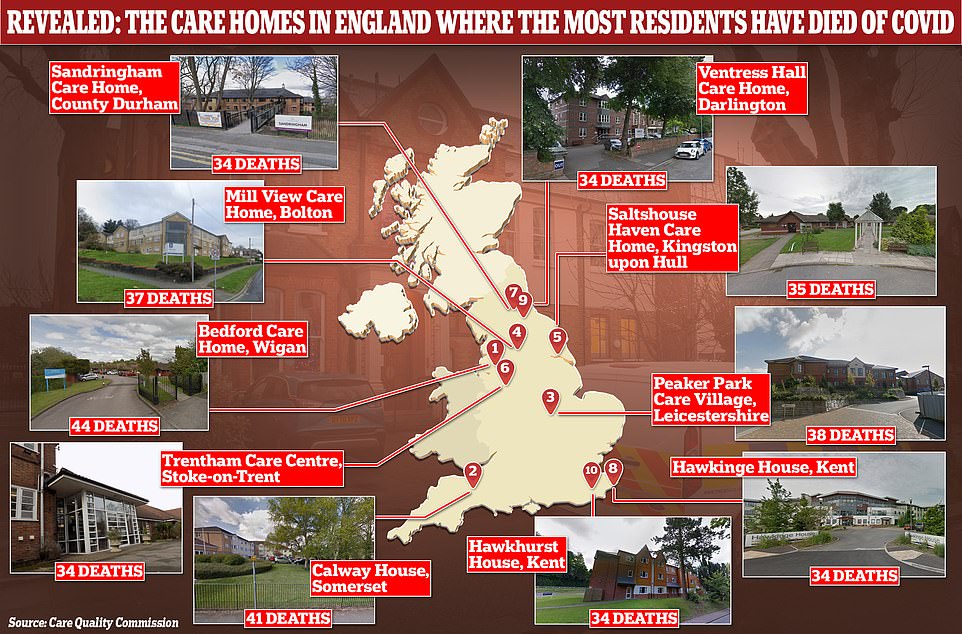
Bedford Care Home in Leigh, Greater Manchester, had the worst virus death toll in the country, with 44 victims — 24 per cent of the home’s capacity — Care Quality Commission has revealed
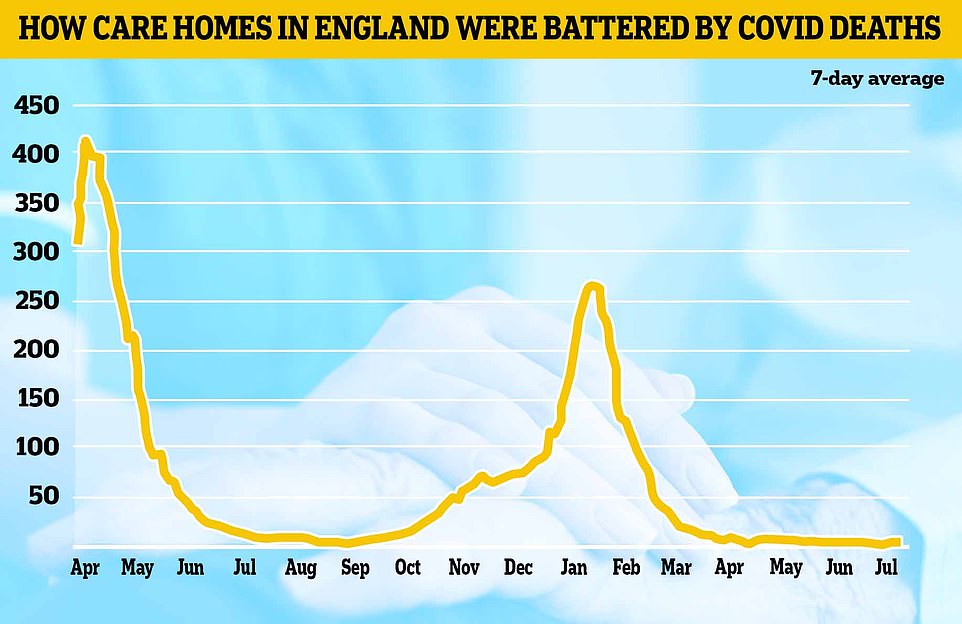
No10 refuses to rule out making people prove they are double-jabbed to get into PUBS
No10 today refused to rule out making people prove they are double-jabbed to get into pubs – as Tory rebels vowed to fight Boris Johnson’s ‘disgusting’ threat to restrict access to nightclubs.
The PM faces a furious backlash from MPs and civil liberties campaigners after delivering an ultimatum to young people about the shape of the rules from September at a press briefing last night.
And pushed on whether the prospective edict could apply to bars as well Downing Street merely said it will ‘use the coming weeks to look at the evidence’.
Former Supreme Court justice Lord Sumption said the move was ‘completely unnecessary’ given the high rates of vaccine take-up across the UK.
Scientist Carl Heneghan suggested it is the thin end of the wedge, saying if the government is worried about ‘crowded spaces’ they will end up demanding medical evidence to board the Tube.
And Professor Sir Jonathan Montgomery, who chaired the ethics advisory board for NHSx on its contact tracing app, warned that ministers need to be wary about ‘where incentive meets coercion’. Critics also pointed out that being vaccinated is not a guarantee people do not have coronavirus, with around 40 per cent of hospital cases having been jabbed.
Tory MP Charles Walker declared he will vote against the plan if it comes to the Commons after the summer recess. ‘It will start with nightclubs and then quickly move on to other parts of the hospitality sector,’ he told BBC Radio 4’s World at One.
Another senior lockdown-sceptic told MailOnline there are ‘likely’ to be enough Tory rebels. But they stressed a revolt would be ‘pointless’ unless Labour lines up against the measures.
‘It’s all about Keir Starmer… unless Labour go through the division lobbies in opposition it will happen,’ the MP said.
The MP said the PM’s was using a ‘disgusting’ tactic to pressure young people to get jabs. ‘I am profoundly disgusted that a Conservative government is manipulating the public like this… it is awful,’ they said.
Asked whether pubs could also be caught by the requirement, a No10 spokesman said: ‘The Prime Minister talked about the sort of areas we were considering, and nightclubs are where there is significant evidence we have at the moment.
‘But we’re going to use the coming weeks to look at the evidence, particularly both in the UK and globally before making a specific decision.’
Advertisement
It also works on the assumption that people continue to stay at home if they’re sick, keep social contacts limited, wear masks in crowded areas and return to offices in a phased manner.
News that the Government could have to reimpose some Covid curbs comes amid reports that No10 will change its Covid slogan to promote the return to normal this summer.
The ‘hands, face, space’ slogan, which replaced ‘stay home, protect the NHS, save lives’ mantra from the first wave, will be dropped in favour of a plea to ‘keep life moving’ despite hundreds of thousands of people isolating.
The change in guidance comes despite there have been widespread disruptions to the volume of people being ‘pinged’ by the NHS Covid app.
Today a third of the Dorset Police control room staff were off work after being notified by the NHS Covid app or Test & Trace to self-isolate or following a positive test – at the same time as 999 calls surged 20 per cent week on week.
Royal Mail has also seen an increase in absences due self-isolating staff, and this morning announced delays to deliveries in 10 parts of England.
In the face of widespread anger over labour shortages as Covid cases continued to soar, the Prime Minister this week announced a plan for a ‘small number’ of critical workers to be able to continue their functions.
But British Meat Processors Association chief executive Nick Allen criticised ‘confusing messages’ from the Government as he said ministers have not clarified who is applicable.
‘There’s an air of despondency creeping through the industry really. Until now we’ve managed to keep the food supply chain running but there’s a sense of we’re starting to fail on that front,’ he told BBC Radio 4’s Today programme.
Asked if production lines are stalling, he said: ‘They are. It’s happening already. We’re starting to see that at retail level and in restaurants – everyone is struggling to get things out really.’
British Meat Processors Association chief executive Nick Allen said the industry is not clear who is covered by the exemption for a small number of double-jabbed critical workers.
‘It was made very clear to us late yesterday that this exemption will be for very, very few people. They described it as setting the bar very, very high and we’re certainly not counting on that,’ he said.
Pubs and shops have complained about having to close because of the number of people being ‘pinged’ as contacts by the NHS Covid-19 app, while medics have also raised concerns.
The latest figures show more than 500,000 people in England and Wales were asked to isolate by the NHS app in the week up to July 1.
The issue has hit the health service itself, Chris Hopson, chief executive of NHS Providers, saying many ambulance and acute hospital trusts were finding themselves ‘under extreme pressure’ because of a combination of ‘very high demand and very high levels of staff absence due to self-isolation’.
The recent days have seen delays on the Tube, trains and the cancellation of bin collections.
The latest play to be cancelled after losing cast members to self-isolation is Kenneth Branagh’s production of The Browning Version, the Financial Times reported.
Mr Johnson resisted calls from businesses struggling to cope with reduced staffing levels by declining to introduce a more wide-reaching change to quarantine rules ahead of August 16, when a testing regime will replace the requirement for fully-vaccinated contacts to isolate.
The Prime Minister argued self-isolation is ‘one of the few shots we have got left in our locker’ as he scrapped most remaining legal restrictions in England on so-called ‘freedom day’ on Monday.
He suggested an exemption would cover some in hospitals and care homes, or working in the supply of food, electricity and medicines, and transport, defence and borders.
But the Government has said there is no ‘blanket exemption for any sector or role’ and decisions will be made largely on a case-by-case basis.
Source link : https://www.dailymail.co.uk/news/article-9813613/Unions-threaten-strike-paltry-3-NHS-pay-offer.html











